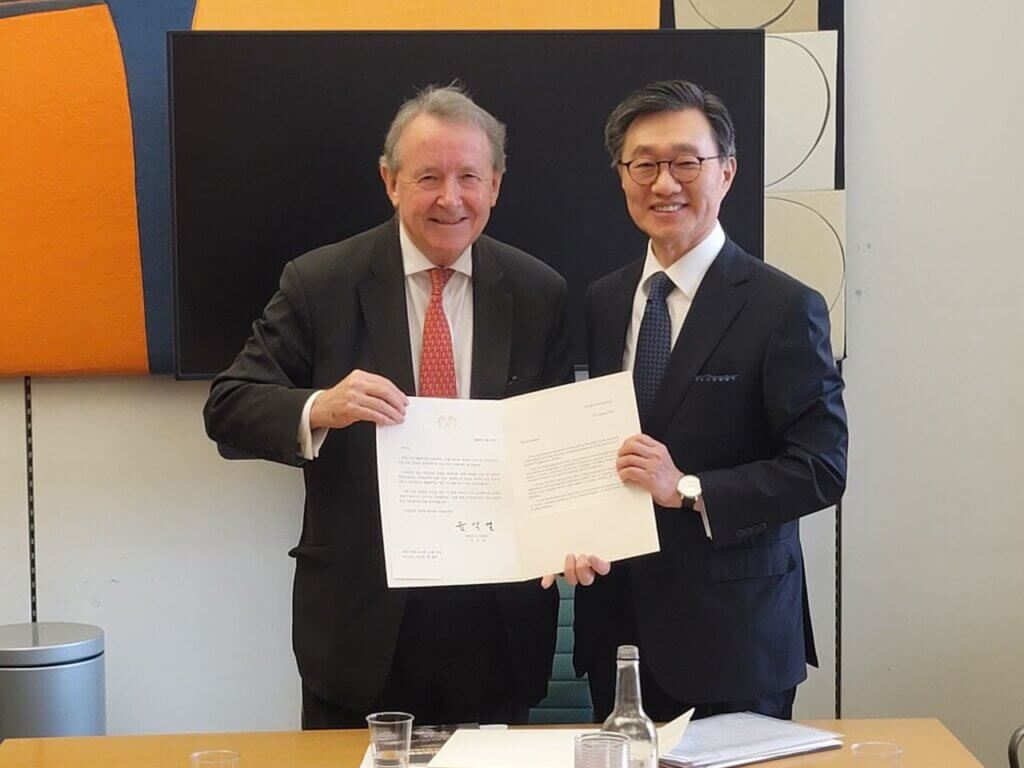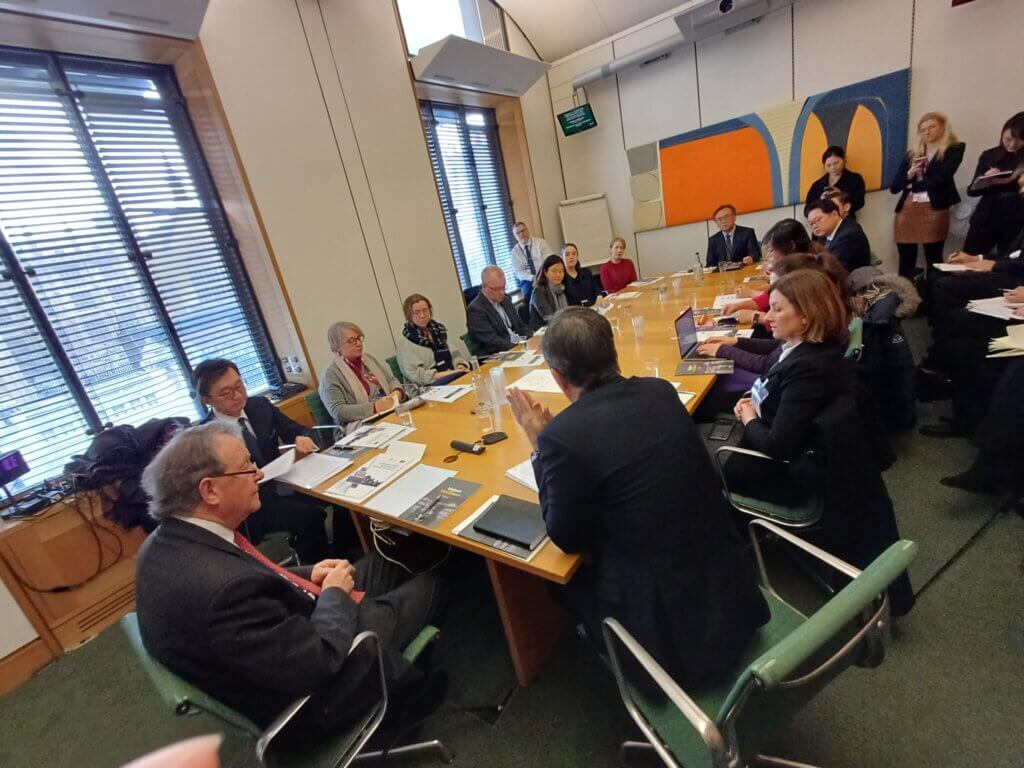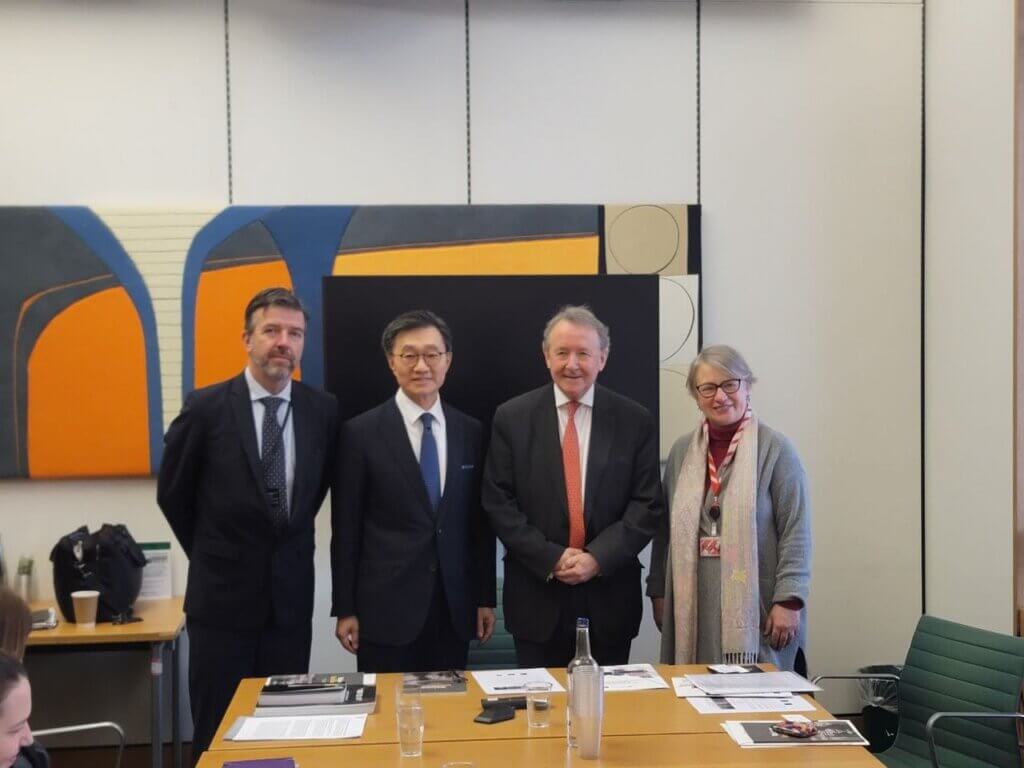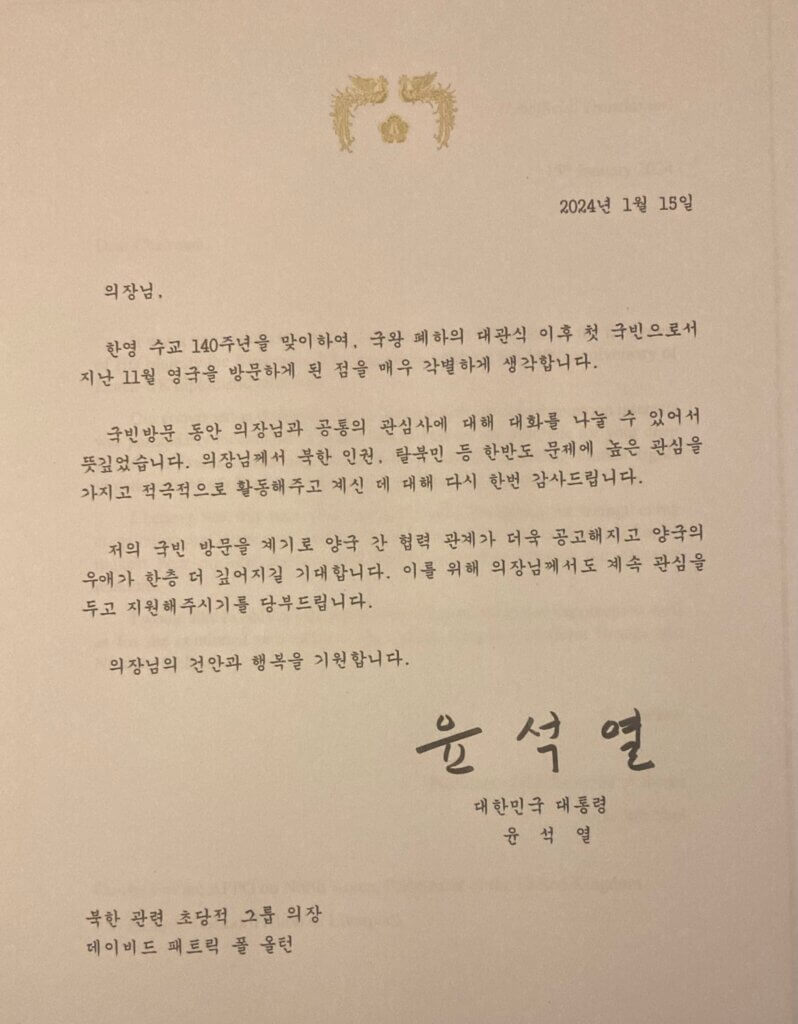
Ambassador Yoon Yeocheol At Westminster during the State Visit of President Yoon Suk Yeol with Sir Lindsay Hoyle MP, Speaker of the House of Commons.
Address of Ambassador Yoon To the North Korea All Party Group
Lord Alton of Liverpool, and Sir Geoffrey Clifton-Brown MP, the co-chairs of the APPG North Korea, Baroness Bennett and Distinguished members of APPG North Korea, Mr. Heenan of UN OHCHR, members of NGOs on North Korea, My dear friends, escapees from North Korea, Ladies and Gentlemen:
Let me begin with my deepest gratitude for the leadership of Lord Alton and members of this group. I wish to commend the critical role APPG North Korea has been playing in raising awareness in the UK Parliament and in the public about the security threat the North Korean regime poses to the international community and the human rights abuse on its own people which call for our urgent attention and action.
Let me also thank Lord Alton who, along with the speakers of the two chambers, welcomed President Yoon Suk Yeol to the UK Parliament, the birthplace of liberal democracy, last November for his historic speech at the Royal Gallery on the occasion of his State Visit to this Kingdom, the first one after His Majesty’s coronation. President Yoon has recently sent his letter to Lord Alton with his appreciation for the important work of APPG North Korea.
Today, I brought the letter from President Yoon to present to you, Lord Alton. With this successful State Visit, Korea and the UK agreed to upgrade our relationship to a Global Strategic Partnership. President Yoon and Prime Minister Sunak also adopted the Downing Street Accord, a comprehensive roadmap for our bilateral cooperation. In the Accord, our two nations renewed our commitment to work closely together on the Korean peninsula issues.

The Accord declared, among others, “The UK supports the objectives of the ROK for a denuclearized, peaceful and prosperous Korean peninsula.” And “we commit to strengthening our cooperation aimed at raising awareness of violations and abuses of human rights, and convincing the DPRK to respect and observe human rights.” And the final sentence in that paragraph says: We support a unified Korean Peninsula that is free and at peace. The North Korean regime has confirmed our joint alarm on its threat and abuse by trading arms with Russia for the latter’s war in Ukraine, starting the New Year with a series of military provocations, declaring a sudden policy change toward the South and attempting to prevent exposure of its people to the South Korean culture. In that regard, today’s session is very timely and would allow us to exchange our views and analyses of what has been taking place recently.
<1. North Korea’s provocations and NK-Russia cooperation> Since January 2022, North Korea has launched more than 100 ballistic missiles, including 13 ICBMs.
North Korea was able to get away with those blatant violations of the UN Security Council Resolutions due to Russia’s war in Ukraine and China’s increasing geopolitical tension with the US. Since the beginning of 2024, its provocations have continued with its artillery fire exercises and launches of most advanced missiles in the sky and seas around the peninsula, raising concerns in the region. To the North’s first artillery fire drill on January 5 with 200 rounds toward NLL, the maritime demarcation line between the South and North, we showed our firm position by responding with 400 rounds of artillery fire, doubling their initial load. The North continued artillery fire for two more days but they were directed toward their inland at a smaller scale, 60 and 88 rounds.
As they seemed to have gotten the message, we also restrained ourselves to prevent the situation from getting out of control. We are also assessing the data we have on the launches of their various missiles to check the advance they may have achieved, which would raise the threat to the rest of the world. Now North Korea is also pursuing military cooperation with Russia despite repeated warnings from the international community. The Foreign Ministers of Korea, the United States and Japan adopted a joint statement in October last year condemning the Russia-North Korea arms trade which the UK government joined immediately with its own statement. When it was found that North Korean ballistic missiles were used in Russia’s attack on Ukraine in January, the UK came out again with a strong statement against such actions of Russia and North Korea.
All arms trade, including ballistic missiles, between Russia and North Korea is a clear violation of multiple UN Security Council resolutions and a serious threat to peace and stability not only on the Korean Peninsula but around the world. We once again strongly urge that such illegal arms trade be stopped immediately. We were also able to see how desperate Russia had become to seek military assistance from North Korea. We also wonder with concern what kind of quid pro quo has been provided to improve and enhance the North’s military capabilities, which would worsen instability in the region and beyond, and what it means to North Korea’s military strategy vis-à-vis the South and its allies. In particular, it is not only deplorable but also contradictory that Russia, who, with grave responsibility as a permanent member, signed up to the UN Security Council’s resolutions on North Korea, has now procured North Korean weapons and used them in its aggression in Ukraine. As a non-permanent member of the UN Security Council from this year, my government will work closely with the UK as well as with our partners in the international community to address the Russian-North Korean military cooperation and its ramifications.
<2. North Korea’s recent change in its attitude toward the South >
The North Korean leader, Kim Jong Un, in his speech at the Supreme People’s Assembly on January 15, declared a sudden change in its policy toward the South, which now they called by its official name, the Republic of Korea, rather than its usual “puppet regime” rhetoric. It was not out of respect but for separation and differentiation of the two Koreas. Kim defined the North and the South as “the two most hostile countries,” and said that the Republic of Korea is “no longer a partner for reconciliation and unification.” He defined the Republic of Korea as a completely foreign country, a primary foe and a permanent principal enemy. He also expressed his desire to occupy the Republic of Korea “in the event of war”, and hinted at the possibility of a nuclear preemptive strike if required. In addition, he ordered the destruction of the Gyeongui Line, the railway line between Seoul and a major North Korean city, which had been a symbol of inter-Korean exchange and hope for eventual reconnection, and the abolition of agencies in charge of inter-Korean relations with such propagandistic monikers as the Committee for the Peaceful Reunification of the Fatherland or the National Economic Cooperation Bureau, which were designed to divide the South Korean populace by sowing confusing, nationalistic messages.
The North regime has regarded the people in the South as brothers of the same nation under the rule of the puppet regime, a collaborator of the American Imperialists, who deserved the liberation by the military might of the North. This logic has been the raison d’etre of the North regime and the ground for its total mobilization of its people and resources for a presumed military showdown with the US. But why did they suddenly dropped all this pretense of brotherhood and stated desire for reunification and lay bare its violent scheme of conquest?
There can be many possible interpretations of this unexpected about-face, but it seems this is essentially a political manoeuvring aimed at achieving the regime’s same old goals with a new cover of excuses and logic. First, North Korea’s move is intended to secure a justification for its relentless drive to strengthen its military capabilities by characterizing its relationship with the South as a basically hostile one and cutting off any lingering sentiments among the North Korean people about commonality with the South. Then, the regime is trying to consolidate its own internal unity by sparking a crisis mode; and finally, it is trying to engage in psychological warfare against the Republic of Korea by dividing Korean society, particularly placing the blame for this confrontation on the current government’s firm stance against the North. We are also bracing ourselves for multiple provocations North Korea is likely to carry out to interfere with the parliamentary elections in South Korea in April.
They will once again try to test our nerve in the lead-up to the elections. So, when we have a closer look, we realize that the new move is not fundamentally different from North Korea’s old tactics because it ultimately aims for unification through the use of armed force. The difference is the context. It is not about liberation of brothers but defeating the arch-enemy in case hostilities break out and eliminating the evil influence of the South on its own people at any cost.
Now South Koreans are “others”, not any more the people from the same nation who have shared the common history of thousands of years. This cynical narrative is anti-national and anti-historical in nature which my government strongly condemns. Now the North regime shamelessly blackmails fellow Koreans in the South, declared lately as hostile people, with its nuclear weapons. Recently, there was a report by BBC about the North Korean authorities punishing teens with hard labour for having watched K-drama. Now North Korean people are banned from taking South Korean style hair or clothes. In 2020 North Korea enacted a law called Reactionary Ideology and Culture Rejection Act to make watching or distributing South Korean entertainment punishable by death. A witness says that admiration of South Korean society can soon lead to a weakening of the system in the North, which was built on myths and lies about the South. In this regard, one can also see that all the tough talk about confrontation and hostility may not be so much aimed at the conquest of the South as aimed at camouflaging its fear of cultural charm of the South upon its people.
<3. North Korean human rights issues and illegal financing>
North Korea continues to develop nuclear missiles at the expense of the well-being of its people and will continue to view those weapons as its only means of survival. Kim Jong Un himself recently admitted that North Korea is in a very precarious situation, unable to provide food and daily necessities to its people. North Korea’s human rights violations are critically important not only to the Korean Peninsula but also to international peace and security as resources for missiles and nuclear weapons development are generated through forced labor and exploitation of its people. In particular, North Korea is raising enormous funds for WMDs through illegal cyber activities. As North Korea was getting financially drained due to the strengthening of UN Security Council sanctions in 2017, it accelerated its efforts to earn foreign currency through illegal cyber activities. Since 2017, North Korea’s revenue from cryptocurrency theft are estimated to exceed $3 billion, and one industry source, Chainalysis, put its revenue in 2022 at $1.7 billion, indicating the trend on the rise. It is estimated that individual North Korean IT personnel, scattered around the world, hide their identities and can earn up to $300,000 per year by receiving work orders from global IT companies.
They send the majority of these illegally-earned-revenues to North Korea to fund its nuclear missile development. This should be stopped by concerted efforts of the international community. <4. The Korean government’s response> Despite these different threats from North Korea and changes in the situation, my government, since inauguration, has maintained a principled and consistent policy toward North Korea. I have presented the ‘Audacious Initiative’ a few times before, so some of you may be already familiar with it. The initiative is centered on our own version of “Containment” policy to create a strategic environment by which the North sees no other way but to take the path toward denuclearization to get out of its diplomatic isolation and economic stagnation.
We intend to build that environment with our Deterrence, Dissuasion and Dialogue, or 3Ds. (Deterrence) We will deter North Korea’s nuclear threat by making it clear that any attack will be met with a rapid, overwhelming and decisive response from the ROK-US alliance. (Dissuasion) We will clearly demonstrate to North Korea the international community’s firm commitment to denuclearization, while discouraging North Korea’s further nuclear and missile development by blocking the North Korean regime’s illegal funding sources so that the regime is dissuaded from pursuing its weapons development any more. (Dialogue and Diplomacy) We will, nevertheless, keep the door to dialogue with North Korea open.
So, when the North comes to realization that all those attempts were futile, we can discuss on how to improve their lives along with ways for denuclearization. And here comes the audacious part. We have a very long list of what we can do for the North, but basically we will be providing a wide variety of assistance and advice to help North Korea enjoy the same prosperity of the South and hopefully same freedom as well. It will range from our help for revamping their infrastructure and arranging the funds from international financial institutions. We are willing to make North Korea another South Korea. At the moment, however, they seem to be still bent on military buildup and provocations. We need to be ready with our firm deterrence posture the first D. And, speaking in one voice with the international community, we will continue to urge North Korea to immediately stop its useless programs, our second D, and return to the diplomacy and dialogue, our third D, on the path to denuclearization.
As we maintain this clear policy towards North Korea, we will need support from our friends and allies around the world. With the highly successful state visit – during which our bilateral relations were completely upgraded – it is no exaggeration to call the Korea-UK relationship a de facto alliance. In this context, it is my sincere hope that the Republic of Korea will continue to work closely with the UK, not only to respond to the challenges from the North, but also to establish a sustainable peace on the Korean peninsula which will serve for all Koreans and help create eventually “a united Korea which is free and at peace” as we pledged in our accord. Thank you for your kind attention


James Heenan of UN Human Rights Office, Ambassador Yoon, Lord Alton of Liverpool, Baroness Bennett of Manor Castle.



